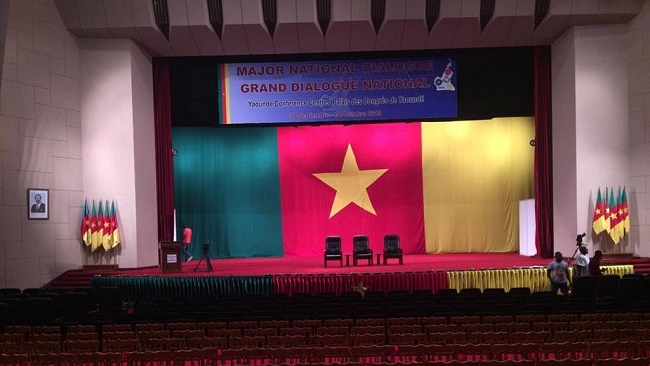Ambazonians derisive over ‘special status’ move in Cameroon crisis
A move aimed at easing the bloody crisis in Cameroon’s English-speaking regions has gained traction among moderates but failed to overcome a roadblock of resistance by radical separatists.
Nearly 1,000 delegates have hunkered down since Monday for the talks in the capital Yaounde, which is being shunned by the main separatist leaders.
On the eve of the forum’s close, delegates on Thursday adopted a resolution recommending “special status” for the English-speaking areas “aimed at strengthening the autonomy of administrative areas.”
Two areas in western Cameroon — the Northwest Region and Southwest Region — are home to most of the country’s anglophones, who account for about a fifth of a population that is overwhelmingly French-speaking.
Two years ago, decades of resentment at perceived discrimination boiled over into an armed campaign for independence that has met with a brutal crackdown.
The International Crisis Group has estimated that nearly 3,000 people have been killed in violence committed by both sides and more than half a million people have fled their homes.
Biya concession?
If Biya backs the forum’s proposal, it would mean more fiscal autonomy, the election of regional governors by locals instead of people named by the federal government and the re-establishment of traditional chiefs in the two regions.
If so, it could be a significant political concession.
Biya, in power for nearly 37 of his 86 years, has sternly opposed attempts to give up centralised control.
Prominent anglophone human-rights lawyer Felix Agbor Nkongho said a special status marked a “first step” towards a permanent solution.
Edouard Epiphane Yogo of the Bureau of Strategic Studies, a thinktank in the capital Yaounde, said the status, which would require a change to the constitution, “could have major symbolic value.”
“It would be a victory for those who absolutely want federalism, and a victory for those who want decentralisation.”
But several separatists said they were unimpressed.
Ebenezer Akwanga, a prominent leader, said the people of self-described Ambazonia — the country the separatists want to carve out of Cameroon — did not “need a special status.”
“We don’t want to be a part of Cameroon,” he said. “Ambazonia is marching to freedom and nothing can stop us.”
Another leader, Chris Anu, said the notion of a special status was almost an insult.
“Are they suggesting we are a handicap?” he asked.
The goal, he said, was “nothing less than total independence for the people of the Southern Cameroons,” another name used by separatists for their envisioned homeland.
Anglophone campaigner Ayah Ayah Abine said that the situation had polarised on both sides and would not be resolved by “a combination of fuzzy words” about status.
“Something really special is needed to end this conflict,” he said. “Only negotiations between the two sides can end it.”
Prisoner release
In another announcement on Thursday, the government said Biya had ordered the release of “more than 330 people” detained in connection with the anglophone crisis.
Prime Minister Joseph Dion Ngute said Biya had sought “a measure to calm (the situation)… while we continue our work.”
That move was loudly applauded at the “dialogue” and many separatists also welcomed it, although they also called for an overall amnesty.
At least 1,000 people have been detained over the past two years.
More than 100 detainees were ordered released on Friday by two military tribunals, judicial and administrative officials told AFP.
Details as to which prisoners qualify for release remain unclear.
But there seems little chance that the main separatist leader, Julius Ayuk Tabe, who was sentenced to life in prison in August along with nine supporters on “terrorism” changes, will be freed.
Yogo, at the Yaounde thinktank, pointed to the difficulties that their detention entailed.
“If you want to restore peace, usually it’s symbols that count,” he said.
In this context, “the symbol is not the number (of released prisoners) but the calibre” of those released, he said.





